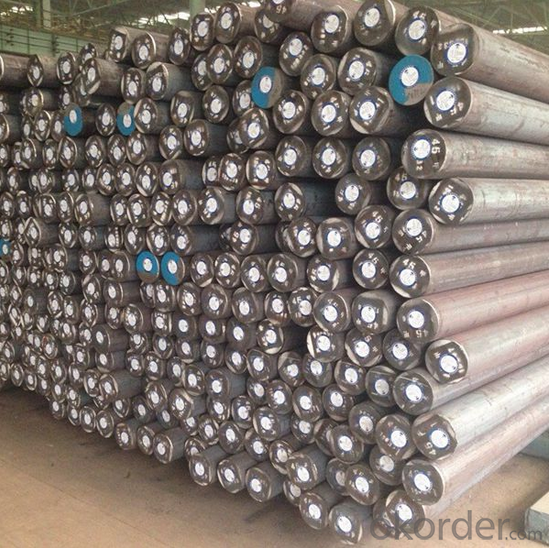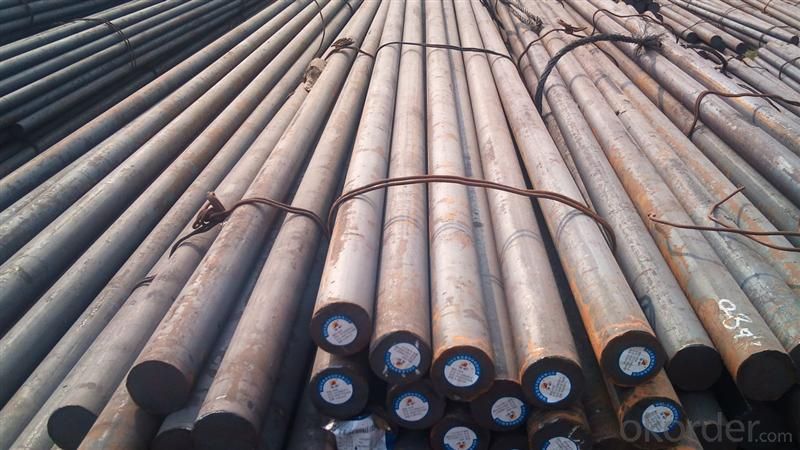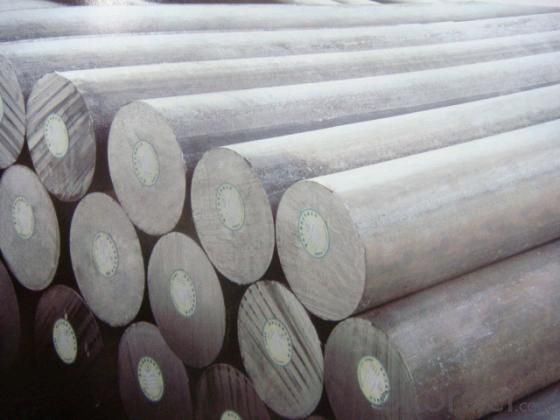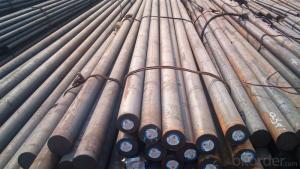Special Steel Scm440 Aisi 4140 Steel CNBM
- Loading Port:
- Tianjin
- Payment Terms:
- TT OR LC
- Min Order Qty:
- 25 m.t.
- Supply Capability:
- 50000 m.t./month
OKorder Service Pledge
OKorder Financial Service
You Might Also Like
Item specifice
Special Steel Scm440 Aisi 4140 Steel CNBM
Product Description:
1.Dia: 10mm-300mm
2.Length: 3000mm-12000mm
3.Process: EAF + LF + VD + Forged + Heat Treatment (optional)
4.Delivery condition: Hot forged +Rough machined (black surface after Q/T)+ Turned (optional)
5.Forged ratio: no less than 3:1
6.Technical Data: According to the customer's requirement of Chemical Composition, Physical Properties and Mechanical Testing
7.Test: ultrasonic test according to SEP 1921-84 3C/c
8.Material details will be as per agreed technical specifications
9.Certificate of Quality: issued in English, in addition the normal terms
Chemical Composition:
GB | AISI | JIS | DIN | C | Si | Mn | Cr | Mo |
27SiMn | - | - | - | 0.24-0.32 | 1.10-1.40 | 1.10-1.40 | 0.3 | 0.10-0.15 |
40Cr | 5140 | SCM440 | 41Cr4 | 0.37-0.44 | 0.17-0.37 | 0.50-0.80 | 0.80-1.10 | 0.10-0.15 |
35CrMo | 4135 | SCM435 | 34CrMo4 | 0.32-0.40 | 0.17-0.37 | 0.40-0.70 | 0.80-1.10 | 0.15-0.25 |
42CrMo | 4140 4142 | SCM440 | 42CrMo4 | 0.38-0.45 | 0.17-0.37 | 0.50-0.80 | 0.90-1.20 | 0.15-0.25 |
Application:
scm440 hot rolled round bars and forged round bars used in the manufacture of requirements higher than
35 crmo steel strength and conditioning section larger forgings, such as locomotive traction with the big gear,
supercharger drive gear, pressure vessel gear.
Product Show:



- Q:Can special steel be used for making nuclear industry components?
- Yes, special steel can be used for making nuclear industry components. Special steel, also known as alloy steel, possesses certain properties that make it suitable for use in the nuclear industry. These properties include high strength, excellent corrosion resistance, and good resistance to high temperatures and radiation. Nuclear industry components, such as reactor pressure vessels, steam generators, and fuel rods, operate under extreme conditions of high pressure, high temperature, and exposure to radiation. Special steel can withstand these conditions and maintain its structural integrity, ensuring the safe and reliable operation of nuclear facilities. The use of special steel in the nuclear industry also helps to prevent the release of radioactive materials. The high corrosion resistance of special steel reduces the risk of leakage and contamination, thereby enhancing the safety of nuclear power plants. Furthermore, special steel can be tailored to meet specific requirements of the nuclear industry. Different types of special steel alloys can be developed with specific compositions and heat treatments to optimize their properties for nuclear applications. This allows for the customization of steel components to meet the unique demands of the nuclear industry. In conclusion, special steel can indeed be used for making nuclear industry components due to its high strength, corrosion resistance, and resistance to high temperatures and radiation. Its use contributes to the safety and reliability of nuclear facilities, while also allowing for customization to meet specific requirements.
- Q:What is the cost of special steel compared to other materials?
- The price of special steel can vary depending on various factors when compared to other materials. Special steel, also known as alloy steel or tool steel, is generally more expensive than regular carbon steel due to its superior properties and composition. Its strength, durability, and resistance to wear and corrosion make it ideal for specialized applications in industries like automotive, aerospace, and construction. In comparison to non-ferrous metals like aluminum or copper, special steel often has a lower cost. However, it is important to note that different types of special steel can have different price ranges. For example, stainless steel, which contains chromium and other elements for better corrosion resistance, tends to be pricier than carbon steel. When comparing the cost of special steel to materials like plastics or composites, it is crucial to assess the specific project requirements. While these alternatives may have lower initial costs, they may not possess the same level of strength, heat resistance, or durability as special steel. Therefore, the long-term benefits and savings offered by special steel, such as reduced maintenance, longer lifespan, and improved performance, should also be considered. Ultimately, the price of special steel compared to other materials is influenced by factors such as the type and grade of steel, market demand, quantity needed, and any additional processing or finishing required. Consulting with suppliers, considering the specific application requirements, and conducting a comprehensive cost-benefit analysis will help determine the most suitable and cost-effective material choice for a particular project.
- Q:What are the main advantages of using special steel in the medical field?
- The main advantages of using special steel in the medical field are its high strength and durability, corrosion resistance, and compatibility with sterilization processes. Special steel can withstand harsh conditions and repetitive use without compromising its integrity, making it ideal for medical devices and surgical instruments. Additionally, its resistance to corrosion ensures a longer lifespan and reduces the risk of contamination. The compatibility with sterilization methods, such as autoclaving, ensures that medical equipment remains safe and sterile for patient use.
- Q:Can special steel be used in the aerospace industry?
- Yes, special steel can be used in the aerospace industry. Special steel alloys, such as stainless steel or titanium alloys, are commonly utilized in the aerospace industry due to their high strength-to-weight ratio, corrosion resistance, and ability to withstand extreme temperatures and pressures. These properties make special steel suitable for various components in aircraft and spacecraft manufacturing, including structural elements, engine parts, landing gears, and fasteners.
- Q:How does special steel perform in forging applications?
- Special steel is highly valued in forging applications due to its remarkable strength, durability, and ability to withstand wear and tear. The exceptional properties of special steel, such as its high tensile strength, heat resistance, and resistance to corrosion, make it an ideal option for enduring the extreme conditions involved in forging processes. When exposed to the intense heat and pressure of forging, special steel maintains its structural integrity and mechanical properties. It can endure extreme temperature fluctuations without losing its hardness or becoming brittle, guaranteeing that the final forged product is of superior quality and reliability. Moreover, special steel offers excellent machinability and formability, enabling it to be easily shaped and manipulated during the forging process. This ease of working with special steel empowers manufacturers to create intricate and complex shapes, resulting in finely crafted forged components. Special steel also demonstrates exceptional resistance to fatigue and impact, making it highly suitable for applications that require high strength and toughness. It can endure repeated stress and load cycles without experiencing significant deformation or failure, ensuring the longevity and dependability of forged products. Additionally, special steel is renowned for its resistance to corrosion and oxidation, further enhancing its suitability for forging applications. It can withstand exposure to harsh environments, chemicals, and moisture, making it ideal for manufacturing components subjected to demanding operating conditions. Overall, special steel's outstanding performance in forging applications can be attributed to its high strength, durability, resistance to wear and tear, excellent machinability, and corrosion resistance. These properties establish it as a preferred choice in various industries, including automotive, aerospace, construction, and oil and gas, where reliable and efficient operations rely on high-quality forged components.
- Q:How does special steel perform in high-temperature fatigue resistance?
- Special steel performs well in high-temperature fatigue resistance due to its unique composition and heat treatment processes. It has enhanced mechanical properties, such as high strength and toughness, which enable it to withstand repeated cyclic loading and resist deformation, even at elevated temperatures. Additionally, special steel exhibits excellent thermal stability, preventing the degradation of its microstructure and maintaining its mechanical properties over time. Overall, special steel is a reliable material choice for applications requiring high-temperature fatigue resistance.
- Q:What are the main characteristics of alloy steel?
- Alloy steel is a type of steel that is made by adding certain elements, such as chromium, nickel, or molybdenum, to iron. These additional elements give alloy steel its unique properties and characteristics. Some of the main characteristics of alloy steel include: 1. High strength: Alloy steel is known for its exceptional strength. The addition of alloying elements enhances the steel's ability to withstand high pressures and heavy loads, making it ideal for applications that require a strong and durable material. 2. Hardness: Alloy steel is also known for its hardness. It has a higher level of hardness than regular carbon steel, which makes it resistant to wear, abrasion, and deformation. This characteristic makes alloy steel suitable for applications where resistance to impact or wear is crucial, such as in the manufacturing of cutting tools or machinery parts. 3. Corrosion resistance: Depending on the specific alloying elements added, alloy steel can exhibit excellent resistance to corrosion. Chromium, for example, is commonly added to alloy steel to create stainless steel, which is highly resistant to rust and corrosion. This characteristic makes alloy steel a preferred material in industries where exposure to moisture or corrosive environments is common. 4. Heat resistance: Alloy steel is known for its ability to withstand high temperatures without losing its strength or structural integrity. The addition of elements like nickel, molybdenum, or vanadium enhances the steel's ability to resist thermal expansion, oxidation, and softening at elevated temperatures. This characteristic makes alloy steel suitable for applications in the aerospace, automotive, and power generation industries. 5. Versatility: Alloy steel is a versatile material that can be easily customized to meet specific requirements. By varying the composition and proportions of alloying elements, manufacturers can create alloy steel with a wide range of properties, such as improved ductility, toughness, or electrical conductivity. This versatility allows alloy steel to be used in various industries, including construction, manufacturing, and engineering. Overall, the main characteristics of alloy steel are high strength, hardness, corrosion resistance, heat resistance, and versatility. These properties make alloy steel a preferred choice for a wide range of applications that require a strong, durable, and reliable material.
- Q:How does special steel contribute to the manufacturing of industrial machinery?
- Special steel contributes to the manufacturing of industrial machinery by providing enhanced strength, durability, and resistance to wear and corrosion. It allows for the production of components that can withstand high temperatures, heavy loads, and harsh operating conditions. This robust material ensures the reliability and longevity of industrial machinery, ultimately improving productivity and efficiency in various sectors such as mining, construction, and manufacturing.
- Q:What are the different types of tool and die steel?
- There are several different types of tool and die steel, including high-speed steel, cold work steel, hot work steel, and plastic mold steel.
- Q:What are the challenges in heat treatment of special steel alloys?
- The challenges in heat treatment of special steel alloys primarily revolve around achieving the desired mechanical properties while maintaining the material's chemical composition and microstructure. Special steel alloys often contain a complex combination of elements, making it crucial to carefully control the heating and cooling processes to prevent undesirable phase transformations or the formation of unwanted precipitates. Additionally, the high hardenability of some special steel alloys can lead to difficulties in achieving uniform hardness throughout the material. Achieving precise temperature control, as well as managing the time and cooling rates, becomes critical in order to avoid issues such as distortion, cracking, or reduced mechanical strength. Overall, the challenges in heat treating special steel alloys lie in finding the right balance between achieving the desired properties while avoiding any detrimental effects on the material's integrity.
1. Manufacturer Overview |
|
|---|---|
| Location | |
| Year Established | |
| Annual Output Value | |
| Main Markets | |
| Company Certifications | |
2. Manufacturer Certificates |
|
|---|---|
| a) Certification Name | |
| Range | |
| Reference | |
| Validity Period | |
3. Manufacturer Capability |
|
|---|---|
| a)Trade Capacity | |
| Nearest Port | |
| Export Percentage | |
| No.of Employees in Trade Department | |
| Language Spoken: | |
| b)Factory Information | |
| Factory Size: | |
| No. of Production Lines | |
| Contract Manufacturing | |
| Product Price Range | |
Send your message to us
Special Steel Scm440 Aisi 4140 Steel CNBM
- Loading Port:
- Tianjin
- Payment Terms:
- TT OR LC
- Min Order Qty:
- 25 m.t.
- Supply Capability:
- 50000 m.t./month
OKorder Service Pledge
OKorder Financial Service
Similar products
New products
Hot products
Related keywords





























